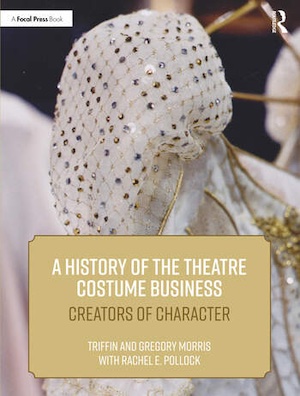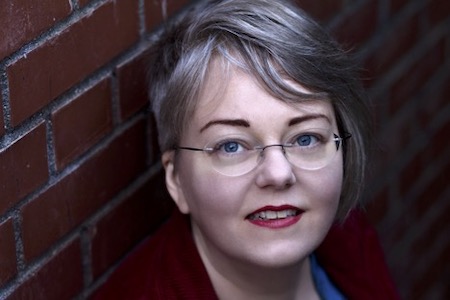By Monica Sager
Rachel Pollock (ΦBK, University of Tennessee, Knoxville) is a professional costumer and has worked as a dyer at the Broadway production house Parsons-Meares, Ltd. on shows like Hamilton, Lion King, and Frozen. Most recently, Pollock co-authored A History of the Theatre Costume Business (Routledge, 2021), which is the first comprehensive book on the subject and analyzes why stage clothes are made, by whom, and how.
“I hope people really learn about the intricacy of construction, the diversity of skills, and the wide fields of knowledge that these folks had to have,” Pollock said. “It’s not just buying a simple pattern at Joan’s and sewing it together. It really is a very sophisticated field that has been sort of overlooked.”
Pollock wrote the book with couple Gregory and Triffin Morris. Triffin is a professional costume maker who has worked on Broadway musicals, and she is the head of the graduate program where Pollock lectures. Gregory is a business history journalist. The two recognized that nothing was written about the history of the costume making business.
“There’s plenty about the design aspect of costuming but not really anything about the people who make the designs and turn them into actual things that people can wear and do choreography in,” said Pollock, who wrote portions of four chapters in the book.

Pollock said that the book encompasses a wide variety of topics, including how immigrants endured a lot and still started their own businesses, at a time when women couldn’t have their own bank accounts in the United States. And yet, Pollock said that these women gained a liberal arts education of sorts through discovering historical thought, movement, the mathematics of bookkeeping and more to bring into their craft.
“Most of the chapters that I wrote were about the early business owners in the 20th century, which were primarily women in Eastern Europe escaping the Bolshevik Revolution,” Pollock said. “It was so inspiring, and it was clear to me that all of these women came out of incredibly supportive family situations that encouraged them to learn as much as they could . . . . There’s not a book for it, and there wasn’t a blueprint for it. They had personal experiences and interesting educational experiences.”
Growing up, Pollock’s family had always been patrons of the theatre with season tickets to her town’s playhouse.
“I remember piecing fabric together at the Boys and Girls Club while my mom was at work,” Pollock said. “Sewing had always been present—and when I realized theatre was a career you could do and I recognized that my talent didn’t lie in the performance—I was really drawn to the costume.”
It was in college that she realized shows go beyond just the actors, so she started focusing on the trade.
“The necessity of collaboration between all aspects of a theatre production was something that was evidenced (in college),” Pollock said. “It also showed me how intertwined liberal arts are with more business related disciplines.”
Pollock noted that people who want to be a lawyer or doctor are able to benefit from a liberal arts education in a similar way that she did because “you don’t do business in a vacuum.”
“You need to understand how the world works,” Pollock said. “For me, that really comes from the diversity of viewpoints that you get from a liberal arts education.”
Pollock was previously a resident lead crafts artisan and dyer for the American Repertory Theatre at Harvard University. She then worked in Los Angeles on films, television, and operas. Pollock has also served as a crafts artisan, dyer, and millner for designers such as Catherine Zuber, David Zinn, Constance Hoffman, and Julie Taymer.
Today, Pollock is a costume crafts artisan and lecturer at the University of North Carolina at Chapel Hill. She said that the education she received at UT Knoxville still supports her within her own teaching style.
“I’m teaching a unit in a class right now about fabric identification,” Pollock said. “That’s really sort of based in textile science. Even though we’re talking about it in terms of when a designer buys fabric, how you determine what you need to do to accommodate its structural nature.”
Pollock said that while it’s not a chemistry class, she is still discussing with her students how dying is a science and that it has a “recipe” similar to cooking, per say, in that there’s a way to do things but the scientific properties can be tweaked to get different results.
Monica Sager is a graduate student at Clark University studying communications. She was inducted into Phi Beta Kappa as an undergraduate there. She completed her Bachelor’s in psychology and student-designed journalism, with a minor in English, in June 2021. Clark University is home to the Lambda of Massachusetts chapter of Phi Beta Kappa.




